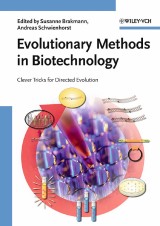Details
Evolutionary Methods in Biotechnology
Clever Tricks for Directed Evolution1. Aufl.
|
219,99 € |
|
| Verlag: | Wiley-VCH (D) |
| Format: | |
| Veröffentl.: | 06.03.2006 |
| ISBN/EAN: | 9783527604623 |
| Sprache: | englisch |
| Anzahl Seiten: | 227 |
DRM-geschütztes eBook, Sie benötigen z.B. Adobe Digital Editions und eine Adobe ID zum Lesen.
Beschreibungen
Miniturization and high throughput assay technology have brought the power of molecular evolution to the bioscience laboratory. Applied wisely, the evolutionary approach can quickly yield the desired result even where other methods have failed.<br> From library generation by random or directed mutagenesis to screening and selection techniques -- the crucial steps for successful evolutionary biotechnology are described in detail in this practical guide that also includes valuable troubleshooting hints on frequently encountered problems.<br> Modern methods for the surface display of peptides and proteins, selective enrichment of nucleic acid aptamers and high-throughput screening of industrial biocatalysts are explained, and computer-based methods for in silico protein and RNA engineering are described as an alternative to in vitro approaches. A special section covers the patenting regulations with regard to biotechnological innovations derived from directed evolution.<br> As an added bonus, a CD-ROM is included that contains software tools for library design, selection of mutagenesis positions, and various predictive algorithms.<br> In short, this practice oriented handbook is an indispensable tool for every scientist working in this interdisciplinary research area.<br> <br>
Introduction<br> Generation of Mutant Libraries Using Random Mutagenesis<br> DNA Shuffling<br> DNA Recombination Using StEP<br> FACS Screening of Combinatorial Peptide and Protein Libraries<br> Selection of Phage-displayed Enzymes<br> Selection of Aptamers<br> Methods for Selecting Catalytic Nucleic Acids<br> High-Throughput Screening of Enantioselective Industrial Biocatalysts<br> Computer-assisted Design of Doped Libraries<br> Directed in silico Mutagenesis<br> RNA Folding in silico<br> Patenting in Evolutionary Biotechnology<br> Programs on CD: How to identify positions suited for mutagenesis;<br> Folding aspects; databases; structure-based design; and more<br> Glossary and Index<br>
"From library generation by random or directed mutagenesis to screening and selection techniques, the crucial steps for succesful evolutionary biotechnology are described in detail in this practical guide, that also includes valuable troubleshooting hints on frequently encountered problems." Process<br> <br> "... contains valuable information." Molecular Biotechnology<br> <br> "... is truly a highly practical handbook, a "must have" for any laboratory practicing directed evolution of proteins, and a methodological "cookbook" of high quality." Angewandte Chemie I.E.<br> <br> "...this volume can be recommended to novices desirous to get started with evolutionary methods as well as experienced scientists of the field." Carbohydrate Polymers<br> <br> "... a useful snapshot of the state of the art of directed evolution methods for academia and industrial working groups." The Quarterly Review of Biology<br> <br> "... a terrific collection of useful tricks and protocols that can be wholeheartedly recommended." ASM News
Susanne Brakmann is head of the junior research group "Applied Molecular Evolution" at the University of Leipzig (Germany) and a Member of the Biotechnological-Biomedical Center of Leipzig. She studied Chemistry at the Technical University of Braunschweig where she received her diploma in 1988, moving afterwards to the University of Karlsruhe to work on her thesis under the supervision of Reinhold Tacke (Ph. D. 1991). She was postdoctoral fellow at the Max-Planck-Institute for Biophysical Chemistry in Gottingen where she worked with Manfred Eigen before she moved to Leipzig in 2001. She is interested in directed evolution as a tool for understanding and optimizing enzyme functions, focusing on nucleic acid polymerases and their biotechnological applications. <br> <br> Andreas Schwienhorst is a group leader at the Institute of Microbiology and Genetics at the University of Gottingen (Germany). He was born in Warendorf and did his studies of Biochemistry and Prehistory in Munster and Gottingen. His thesis was carried out at the Max-Planck-Institute for Biophysical Chemistry under the supervision of Manfred Eigen. He was a visiting scientist at the Salk Institute, La Jolla and the Los Alamos National Laboratory (USA), then took a position as a group leader at the Institute for Molecular Biotechnology before moving to the University of Gottingen in 1997. In 1998 he received the Biofuture Award. Currently, he is interested in the discovery of novel targets for drug intervention as well as in methods of molecular evolution and their applications in drug discovery and catalysis.<br>
Miniturization and high throughput assay technology have brought the power of molecular evolution to the bioscience laboratory. Applied wisely, the evolutionary approach can quickly yield the desired result even where other methods have failed.<br> From library generation by random or directed mutagenesis to screening and selection techniques - the crucial steps for successful evolutionary biotechnology are described in detail in this practical guide that also includes valuable troubleshooting hints on frequently encountered problems.<br> Modern methods for the surface display of peptides and proteins, selective enrichment of nucleic acid aptamers and high-throughput screening of industrial biocatalysts are explained, and computer-based methods for in silico protein and RNA engineering are described as an alternative to in vitro approaches. A special section covers the patenting regulations with regard to biotechnological innovations derived from directed evolution.<br> As an added bonus, a CD-ROM is included that contains software tools for library design, selection of mutagenesis positions, and various predictive algorithms.<br> In short, this practice oriented handbook is an indispensable tool for every scientist working in this interdisciplinary research area.<br> <br>


















